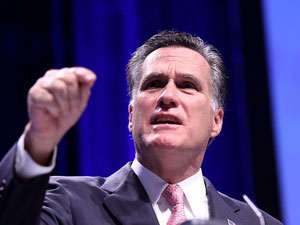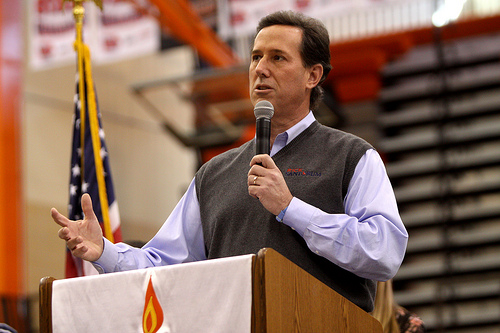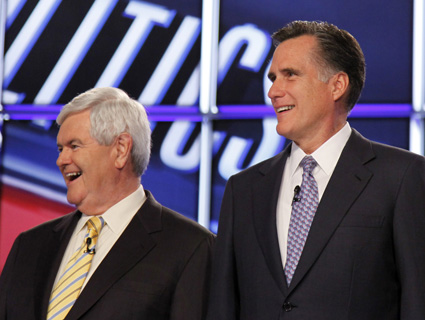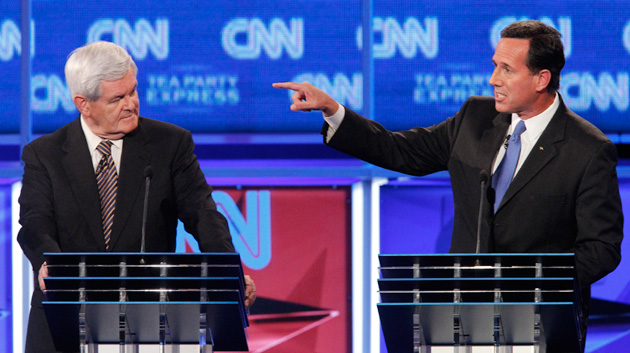 Edmund D. Fountain/St. Petersburg Times/Zuma
Edmund D. Fountain/St. Petersburg Times/Zuma
Read on for the Mother Jones news team’s instant analysis of Saturday night’s GOP presidential debate at Saint Anselm College in New Hampshire.
Romney’s Whopper on Job Creation at Bain
 Mitt Romney/Flickr
Mitt Romney/Flickr
At Saturday’s GOP presidential debate, Mitt Romney, questioned about his record at Bain Capital, doubled-down on the claim that the firm created 100,000 net jobs. “In the business I had, we invested in over 100 different businesses and net-net, taking out the ones where we lost jobs and those that we added, those businesses have now added over 100,000 jobs,” he told George Stephanopolous. It’s an impressive figure, but one that turns out to have little basis in reality. Factcheck.org considered the evidence on Thursday:
When we asked the Romney camp for support, spokesman Eric Fehrnstrom sent us a list of jobs added at three companies in which Bain had invested, saying that these three examples alone created over 100,000 jobs: Staples, which had 89,000 employees as of Dec. 31, 2010; The Sports Authority, which had 15,000 employees as of July 2011; and Domino’s, which has added 7,900 jobs since 1999.
That’s hardly a rigorous analysis of jobs gained and lost at companies Bain backed. And does Romney deserve credit for all of those jobs? Bain was but one of several investors in The Sports Authority, which was launched with the monetary help of William Blair Venture Partners, Phillips-Smith and Marquette Venture Partners. Not to mention the work of founding executives at the company, such as CEO Jack A. Smith.
Plus, Kmart owned the company for about five years starting in 1990. Does Kmart get credit for whatever job growth occurred then? In 2006, the private equity firm Leonard Green & Partners acquired Sports Authority. Does Bain, and Romney, still get credit for jobs created after the company is bought or sold years later?
And so on. The bottom line is that the 100,000 figure was not actually calculated; it was just a composite of a couple of data points, and there’s no evidence that it’s actually a “net” figure, according to Romney’s own campaign. When challenged on the accuracy of his figures by Stephanopolous, Romney told the audience they should just trust him: “I’m a good enough numbers guy to make sure I got both sides of that.”
Ron Paul Calls MLK a “Hero”—After Newsletter Trashed Him as a “World-Class Adulterer”

During Saturday’s ABC News debate, Rep. Ron Paul (R-Tex.) was questioned about the many newsletters published in the 1970s and 1980s under his name that contained racist, homophobic, anti-Semitic, and conspiratorial claims. One of those newsletters, published in December 1990, singled out civil rights champion Martin Luther King Jr. for a barrage of nasty rhetoric. That newsletter called King “a world-class adulterer” and went on to say the legendary civil rights leader “seduced underage girls and boys” and “replaced the evil of forced segregation with the evil of forced integration.”
Amazingly, Paul responded to the question about his racist newsletters by…praising King. Here’s what he said:
More importantly, you ought to ask me what my relationship is for racial relationships. And one of my heroes is Martin Luther King because he practiced the libertarian principle of peaceful resistance and peaceful civil disobedience, as did Rosa Parks did.
Paul’s newsletters contained plenty more incendiary, controversial rhetoric, including instructions for gunning down an “urban youth.” (“An ex-cop I know advises that if you have to use a gun on a youth, you should leave the scene immediately, disposing of the wiped off gun as soon as possible.”) They also said AIDS could be spread intentionally by “a malicious gay” and suggested renaming New York City “Welfaria,” “Zooville,” or “Rapetown.”
At the debate, Paul vehemently denied writing the newsletters. “Well, it’s been explained many times, and everything’s written 20 years ago, approximately, that I did not write,” Paul said. “So concentrating on something that was written 20 years ago that I didn’t write, you know, is diverting the attention from most of the important issues.” But this denial clashes with his own past remarks. In 1996, in an interview with the Dallas Morning News, Paul took ownership of the newsletters. Instead, he blamed critics for skewing the information that appeared in those newsletters. “It’s typical political demagoguery,” he said at the time.
What’s more, in other interviews in 1996 Paul failed to distance himself from the newsletters, defending them repeatedly. Here’s a rundown from ThinkProgress:
—In 1996, Ron Paul’s campaign defended his statements about the rationality of fearing black men. (“[W]e are constantly told that it is evil to be afraid of black men, it is hardly irrational.”) The Houston Chronicle reports, “A campaign spokesman for Paul said statements about the fear of black males mirror pronouncements by black leaders such as the Rev. Jesse Jackson.” [Houston Chronicle, 5/23/96]
—Paul said that his comments on blacks contained in the newsletters should be viewed in the context of “current events and statistical reports of the time.” [Houston Chronicle, 5/23/96]
Paul defended statements from an August 12, 1992 newsletter calling the late Rep. Barbara Jordan (D-TX) a “moron” and a “fraud.” Paul also said Jordon was “her race and sex protect her from criticism.” In response, Paul said “such opinions represented our clear philosophical difference.” [Roll Call, 7/29/96]
“Also in 1992, Paul wrote, ‘Opinion polls consistently show that only about 5 percent of blacks have sensible political opinions.’ Sullivan said Paul does not consider people who disagree with him to be sensible. And most blacks, [Paul spokesman Michael] Sullivan said, do not share Paul’s views.” [Austin American Statesman, 5/23/96]
Santorum: I Cashed Out Because I Care
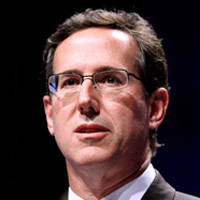 Gage Skidmore/Wikimedia
Gage Skidmore/Wikimedia
During Saturday’s GOP Primary debate, Rep. Ron Paul accused Rick Santorum of being a “big government person” who exploited his beltway connections with lobbyists to get wealthy after losing his Senate seat in 2006. Santorum insisted that he only took a series of high paying “consulting” jobs because he believed in the causes.
“I’m known in this race and I was known in Washington, DC, as a cause guy. I am a cause guy. I care deeply about this country and about the causes that make me —that I think are at the core of this country,” Santorum said. “And when I left the United States Senate, I got involved in causes that I believe in.”
Santorum was one of the less wealthy members of the Senate during his tenure, though as the main gatekeeper for the “K-Street Project,” the attempt to place Republicans in influential positions in DC lobbying firms, Santorum developed plenty of key connections with lobbying firms and trade associations. After leaving Congress those connections proved financially beneficial. Financial disclosure forms filed last year indicate that Santorum went from making around $200,000 a year to more than a million dollars in 2010.
As part of the board of directors of Universal Health Services, Santorum made $395,000 in 2010 from a company that was sued by the Justice Department over Medicaid fraud for allegedly billing the government for psychiatric services to children it never provided. As a “consultant” for Consol Energy, Santorum was paid $142,500 in 2010. Santorum has had a long and beneficial relationship with Consol, who also donated $73,800 to his campaigns over the years. Santorum also made $65,000 from American Continental Group, a high-powered lobbying firm that largely gives money to Republicans. While Santorum might not have been a lobbyist in the strictest legal definition of the term, these groups generally hire old Washington hands like the former Pennsylvania senator because they help open doors in Washington.
Whether Santorum really cares deeply about the issues he was paid to work on is anyone’s guess. But he certainly got paid well for it.
Mitt Romney Is Confused About Iran Sanctions
During Saturday’s Republican debate at Saint Anselm College in Manchester, New Hampshire, GOP front-runner Mitt Romney took his standard swipe at the Obama administration’s foreign policy. Romney went after the president for, among other things, pursuing a murky strategy in Libya (really?) and for making “one error after another” on key foreign policy issues, particularly the Iranian regime’s nuclear capabilities.
“We have a nation, which is intent on becoming nuclear,” Romney said. “Iran has pursued their ambition without having crippling sanctions against them… And he’s failed to put together a plan to show Iran that we have the capacity to remove them militarily from their plans to have nuclear weaponry. Look, this is a failed presidency.”
Here’s the snag with Romney’s critique: There are strict sanctions currently imposed on the regime in Tehran—and on Barack Obama’s watch, they’ve gotten harsher than they’ve been in decades. The Iranian economy is already showing signs that the new economic sanctions on the Central Bank of Iran are tanking the country’s currency. And that’s just the tip of a possibly very ugly iceberg. My colleagues Adam Weinstein and Hamed Aleaziz have a solid run-down of the tense situation in the Persian Gulf:
Over New Year’s weekend [President Obama] signed a defense-spending bill with an amendment that effectively freezes international deals with Iran’s Central Bank. If successful, it would halt much of Iran’s oil sales and further destabilize its currency. It would also hurt European trade and likely cause global oil prices to soar…The White House had strongly opposed the legislation despite bipartisan support for it in Congress, but Obama went on to sign the bill anyway. Why? Apart from the fact that defense spending isn’t really optional, the politics of the situation didn’t seem to favor the White House. As Sen. Mark Kirk (R-Ill.), one of the amendment’s sponsors, put it, “[A]s you enter a presidential contest, there’s no upside to being soft on Iran.”
Think any of this is tough enough for Romney? Considering that he has been saying for years that the United States should aggressively pursue indicting Iranian president Mahmoud Ahmadinejad for violating the Genocide Convention, I wouldn’t bet a dime on it.
Why Romney’s Answer on Contraception Doesn’t Add Up
When moderator George Stephanopolous asked Mitt Romney about his views on contraception at Saturday’s debate, the GOP front-runner acted as if he’d just been asked about chupacabras or spaceships—ignoring his own stated positions on the state efforts to limit access (and ban outright) some forms of contraception.
Stephanopolous’ question was simple: “Governor Romney, do you believe that states have the right to ban contraception? Or is that trumped by a constitutional right to privacy?” Here was Mitt’s answer:
George, this is an unusual topic that you’re raising. States have a right to ban contraception? I can’t imagine a state banning contraception. I can’t imagine the circumstances where a state would want to do so., and if I were a governor of a state or…or a—or a legislature of a state—I would totally and completely oppose any effort to ban contraception. So you’re asking—given the fact that there’s no state that wants to do so, and I don’t know of any candidate that wants to do so, you’re asking could it constitutionally be done? We can ask our constitutionalist here.
At this point, Romney turned to Rep. Ron Paul, a self-described “constitutionalist,” and the crowd laughed. But it was a serious question, given that in 2007 Romney supported a federal personhood amendment that would have defined life as beginning at fertilization, and in 2011, he did his best to avoid saying definitively whether he opposed Mississippi’s “personhood ammendment,” which would have made all forms of hormonal contraception illegal. (My colleague Kate Sheppard has explained the issue quite clearly.) In other words, state- and federal lawmakers are very much trying to ban contraception.
After some crosstalk, Romney started up his answer again, and was insistent. “George, I—I don’t know whether a state has a right to ban contraception. No state wants to. I mean, the idea of you putting forward things that states might want to do that no—no state wants to do and asking me whether they could do it or not is kind of a silly thing, I think.” When Santorum again pressed him, Romney was incredulous, “Has the Supreme Court—has the Supreme Court decided that states do not have the right to provide contraception?”
No—they decided the opposite in Griswold v. Connecticut, ruling that the right to privacy prohibited states from banning contraception. But it’s a sore point with conservatives, like Rick Santorum, who believe the right to privacy is a load of a baloney. And in light of the nationwide Personhood movement, it’s hardly a dead issue.


